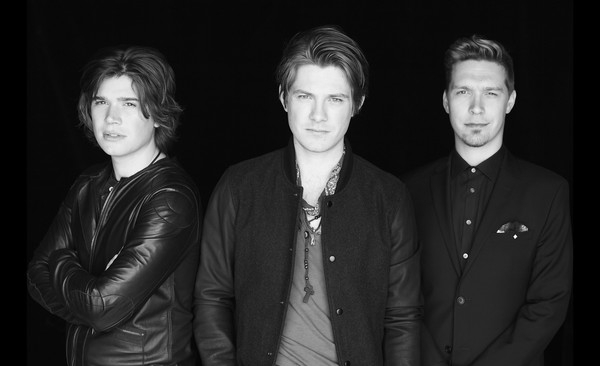“It’s definitely full-bodied, high alcohol-content pale ale,” laughs the eldest of the Hanson tribe, Isaac. “It has a lot of malt and has a nice hoppy mellow finish. We’re not sure whether we’re going to be able to bring it down to Australia or not, but we’re working on it.”
Hanson’s approaching foray Down Under is off the back off their latest album Anthem,a record heavily inspired by the energy of their live shows. “It’s the kind of music that might scare away certain people,” he jokes. “But luckily, we have a really great connection with our fan base. I think they understand the eclectic-ness of who we are. On our records, even on Anthem, there are a lot of variations from the beginning to the end, stylistically speaking. I think we’re never afraid to be who we are, no matter what that entails.”
Being true to themselves has been an imperative factor in Hanson’s lengthy career. The fresh-faced youngsters exploded onto the scene in 1997 and experienced incredible success when they were only teenagers (Isaac was 16 when Middle of Nowhere launched the young band into the stratosphere). Given their subsequent departure from the colossal limelight cast upon them, it would be easy to assume the brothers must’ve experienced an inevitable fate of ‘falling off the track’ that so many young people within the industry fall victim to. But they didn’t. According to Isaac, the band worked hard to ensure they didn’t become another clichéd tale of washed-up pop stars.
“We’ve made a point to always take responsibility for what we’re doing,” he stresses. “I think we’ve been lucky that in the process, we kept our heads down and moved forward. Because the managers, the labels, the merchandise companies… they can go on to do other things, but forever and ever your name is on that thing you’re creating, and you’ve got to own it.
“You can’t control what other people feel and what other people say,” he continues, “but you can control who you are and how you respond to things.”
It’s this mature outlook that helped Hanson forge a strong connection with their fans for the past 17 years, which sees them continue to sell out concert halls worldwide in a matter of days. And while he can’t pinpoint why their fans have maintained such loyalty, Isaac hopes their dedication toward the band is purely based on the music, and nothing else.
“I don’t know [why] for absolute sure,” he admits. “I’d like to think it’s because we write good pop songs, or because we put on a good show. It has to be on some level, at least, that the fans feel excited about the shows they saw, or an album they heard. I mean otherwise they wouldn’t come back again. But it’s hard to know for certain. I think we have always been unabashedly ourselves, from the very beginning until now. Nothing about who we are is either over calculated or pretentious. We are who we are and maybe that’s why they stay.”
Isaac’s history with music has been extensive, to say the least. He began writing songs from the age of nine, which may seem quite young to the average person. However, he was a late bloomer in comparison to his brothers.
“I struggled as a reader when I was six or seven years old,” he admits. “But at the same time, when I was three-years-old, I was sitting in my highchair or in my car seat and humming songs to my family members! Everybody’s born a certain way and with a certain set of skills, and for those of us who are musically inclined, it starts off relatively early.”
When they’re not touring the world and recording albums, Hanson have developed a writer’s workshop, where they invite fellow artists to join them in a week of creating, songwriting and recording. Since 2005, they have collaborated with a stream of big name artists, such as Ben Kweller, Jason Mraz and even Weird Al Yankovic. Some of the songs recorded on the musical retreat form an annual fan club EP, which contains music that is often left of centre and unlike their regular songs. According to Isaac, the retreat helps the artists to stretch their musical muscles.
“The primary purpose of the event is to create, without pre-conceived notion, without concern if it’s the right song for a record,” he says. “We are songwriters first, we are music fans first and we very rarely say we can’t do something, at least on a creative level. A good hook is a good hook, we’re just not afraid to chase that down, and it’s a lot of fun to do that.”
BY JACQUIE CONGUES







